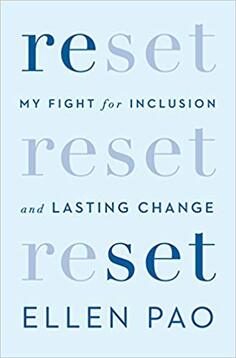|
“I never knew before that this wasn’t okay.” So said one of Ellen Pao’s employees after attending a session on “building a diverse and inclusive team and culture” (180). Employees described “ongoing harassment. Obscene recurring jokes. Inappropriate touching. All-male parties outside the office. A ridiculous number of messages to the team that included [references to female body parts]” (181). Ellen Pao didn’t grow up with a vision to work on issues of diversity and inclusion. She was raised to believe in a meritocracy, and for most of her life, as she worked hard (as an electrical engineer, a lawyer and then a businesswoman), she saw her efforts pay off.
To a young lawyer who doubts that women aren’t valued in the workplace, suggesting that if they weren’t valued, they wouldn’t be kept around in the first place, Pao retorts:
“If you had the opportunity to have a bevy of workers who were overeducated, underpaid, and well-experienced, that you could dump all the menial tasks you didn’t want to do on, that you could get to clean up all the problems, and that you could create a second class out of, wouldn’t you want them to stay?” (134) The lawyer is speechless. Following her dismissal from Kleiner Perkins, as CEO of reddit, a place that housed “an extremely popular porn website” where employees had to be coaxed to consider the removal of “revenge porn and child porn”, Ellen Pao initiated a series of workshops and interventions in order to increase diversity and inclusion at the company, workshops like those that prompted the employees to respond with “I never knew before that this wasn’t okay.” (195, 181) What I want to know is, really? You didn’t know that wasn’t okay? Is that what our culture has come to that we can’t even recognize when something is not okay? After sharing her story, Ellen Pao received stories of discrimination from all sorts of people: “Women who confided such stories in me sometimes shared things they had never told anyone else, not even their husbands; they were embarrassed and ashamed and horrified, even if they’d never done anything improper. They had been trained to keep quiet, to just take on the blame and hold themselves responsible for others’ actions. They’d thought they deserved bad treatment. My lawsuit, they said, proved that someone thought women deserved better. And it went beyond women. People from other underrepresented groups had similar experiences and reached out to me as well with their personal stories.” (bold italics mine) It seems to me that our culture needs love, and clear limits, just like the first good parenting advice I ever read. Like God really. Ellen Pao echoes this when she writes: “The uniform message I heard was that the community needed slow, deliberate changes, consistently applied rules, and action over words. We would make mistakes, and we should be ready to fix them quickly....We had to be consistent. We had to make it clear where the boundaries were. And we had to make sure our team was ready operationally and psychologically to enforce the boundaries.” (195) When you join a venture, do you ask yourself where is the love, and what are the boundaries? Probably not. It seems to me that either we assume love and boundaries exist, or we wander aimlessly, untethered by either concept. If those in the former group were raised with some kind of moral structure, whether grounded in religion or not, then what of those in the latter? Maybe in a culture where entitlement and fear of commitment leads so many to believe that the rules don’t apply to them, we lack the boundaries we desperately need. To reveal it in the extreme, read the words that one “famous public company CEO said on his deathbed, “Why do I have to die?” (120) I hope we don’t all have to have Ellen Pao’s experience before we find our voices. Are there spaces where you could make a difference? Start by defining your space. Then go, and fill it with love. For further reading on how you can learn more about these issues, consider Ellen Pao’s suggestions: Chimamanda Ngozi Adichie’s We Should All Be Feminists Lindy West’s Shrill Susan Antilla’s Tales from the Boom-Boom Room Margot Lee Shetterly’s Hidden Figures Eyal Press’s Beautiful Souls TED talks by Dr. Suzanne Barakat, Brene Brown, Susan Cain and Bryan Stevenson Projectinclude.org and medium.com/projectinclude
0 Comments
Leave a Reply. |
Author's Log
Here you will find a catalog of my writing and reflections. Archives
December 2022
|
